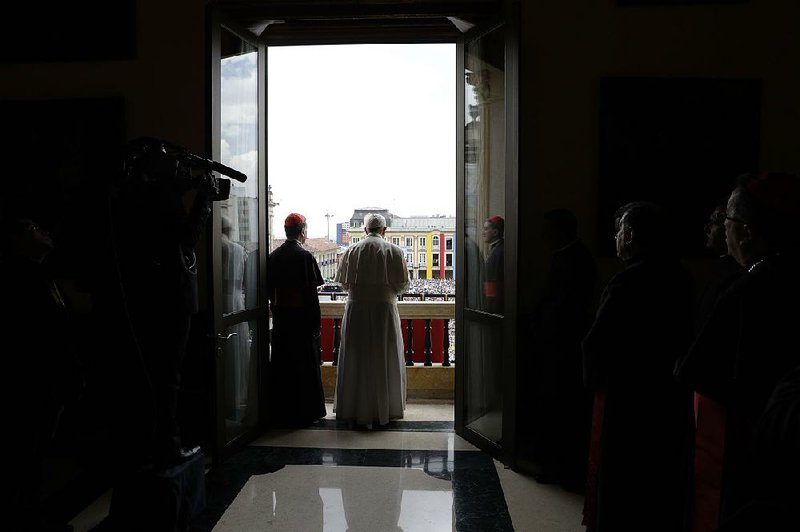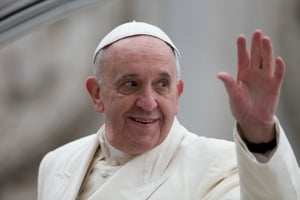BOGOTA, Colombia -- Pope Francis urged young Colombians on Thursday to take the lead in promoting forgiveness after a half-century of armed conflict, and he demanded that the ruling class address the inequalities blamed for Latin America's longest-running armed rebellion.
"There has been too much hatred and violence," Francis told a crowd at Bogota's presidential palace that included disabled children and soldiers with amputated limbs.
Francis received a raucous welcome on his first full day in Colombia, with young choir members abandoning their positions in the palace courtyard and throwing their arms around him as he arrived. The crowd was equally jubilant at Bogota's main Plaza Bolivar, where about 22,000 flag-waving Colombians interrupted him repeatedly.
Later in the day, officials estimated that 1.3 million people flocked to Bogota's main park for his open-air Mass, far more than the 700,000 expected.
History's first Latin American pope took the interruptions, protocol hiccups and security breaches in stride, joking with the crowds and relishing in the adoration of one of the continent's most staunchly Roman Catholic countries.
In his first major speech of his trip, Francis appealed to President Juan Manuel Santos and Colombia's political, cultural and economic elite to avoid the temptation to seek vengeance as the country emerges from the conflict and works to rebuild.
Instead, he said, they should commit themselves to "heal wounds, build bridges, strengthen relationships and support one another."
A year after the government signed a peace accord with rebels of the Revolutionary Armed Forces of Colombia, the guns have fallen silent and 7,000 rebels are making the transition back to civilian life. But Colombians remain badly divided over the accord, with conservative opponents seeing it as too generous for the guerrillas who were behind scores of atrocities during the conflict.
In all, the fighting left more than 250,000 people dead, 60,000 missing and millions more displaced.
Citing the most famous work of Colombia's Nobel laureate, Gabriel Garcia Marquez, Francis said Colombians now needed to reconcile.
"The solitude of always being at loggerheads has been familiar for decades, and its smell has lingered for a hundred years," he said. "We do not want any type of violence whatsoever to restrict or destroy one more life."
Francis appealed to Colombia's youth to take the lead in promoting forgiveness, saying young people more than adults are able to "leave behind what has hurt us and look to the future without the burden of hatred."
"You make us see the wider world which stands before us, the whole of Colombia that wishes to grow and continue its development," he said.
Looking ahead, Francis insisted that Colombia now needed to enact "just laws" to resolve the structural causes of poverty and inequality to "overcome the conflicts that have torn apart this nation for decades."
"Let us not forget that inequality is the root of social ills," he warned.
The Revolutionary Armed Forces of Colombia formed as a Marxist army in the mid-1960s to overthrow Colombia's economic and social system and open the way to redistributing land amid gross economic inequalities.
President Juan Manuel Santos, who won last year's Nobel Peace Prize for his efforts to end the conflict, echoed the pope's words in his speech, urging Colombians to let go of lingering resentments.
"Silencing the guns is worthless if we remain armed in our hearts," he told the crowd. "Ending the war is worthless if we still see each other as enemies."
Francis had a packed day Thursday, meeting with bishops from around the region, including his first encounter with clergy from neighboring Venezuela who want the pope to demand accountability from their country's socialist government and deliver a message of hope to that nation torn by political and economic turmoil.
When Francis arrived Wednesday in Bogota, he was presented on the tarmac with a commemorative peace dove by a youth who was born in a jungle camp to a guerrilla father and a politician mother after she was taken captive in 2002. Clara Rojas, now a congressman, did not see her son after his birth until she was freed in 2008, when he was 3.
Francis then made his way in the popemobile past thousands of people who had stood for hours waiting to catch a glimpse of the pontiff along the 9-mile route from the airport to the Vatican Embassy.
Once at the Vatican mission in Bogota, where Francis will sleep every night, he delivered his first public remarks to a group of young people battling drug addiction, urging them never to lose "happiness and hope."
Information for this article was contributed by Cesar Garcia and Juan Zamorano of The Associated Press.
A Section on 09/08/2017


